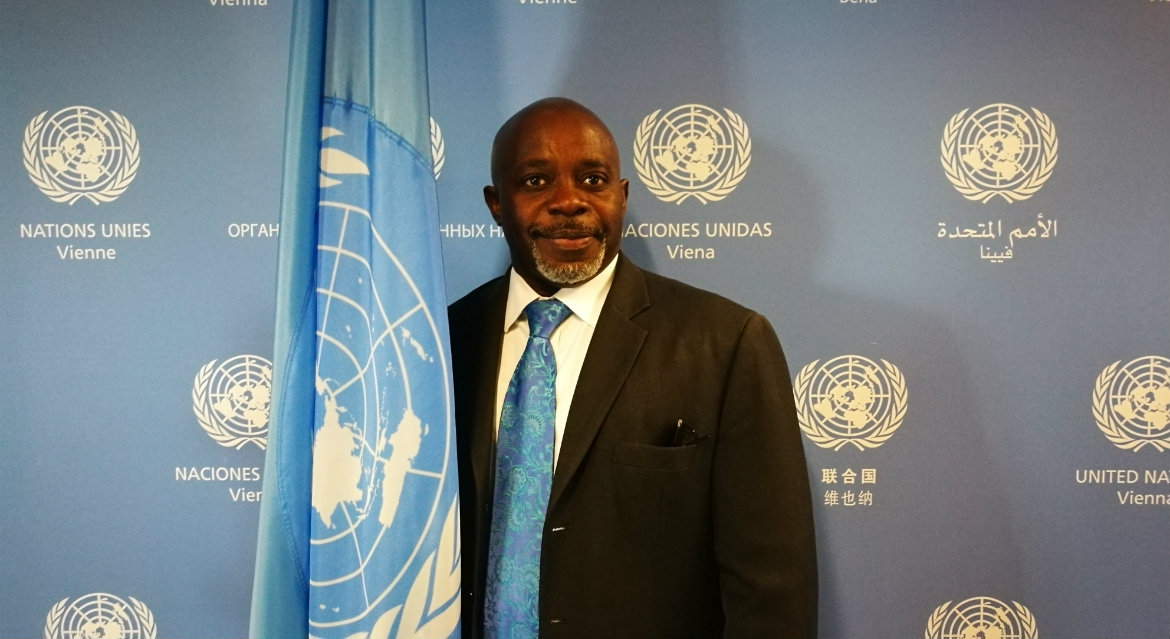Can we create a world safe from drugs?
Published On Tue 21 May 2019 by Grant Hill

The past few years have brought about the most profound shift in the global narcotics trade for decades, according to a leading figure in international drug control efforts who will give a public lecture at the University of Dundee next month.
Dr Justice Tettey, Chief of the Laboratory and Scientific Section at the United Nations Office on Drugs and Crime (UNODC), will be delivering the 2019 Leverhulme Research Centre for Forensic Science Annual Lecture on Tuesday 18 June.
‘A World Safe From Drugs’ will see Dr Tettey explore significant developments such as the opioids crisis that is now spreading beyond North America, the growth of online drug dealing, and the explosion of new psychoactive substances, popularly known as legal highs.
The lecture will also highlight the role the UN is playing in supporting countries in their efforts to address these issues, including early warning systems for dangerous new substances, enhancing national forensic capacity and introducing the United Nations Toolkit on Synthetic Drugs.
“The underlying aim of everything the UNODC does is to protect the health and welfare of people around the world,” said Dr Tettey. “However, we have been in crisis mode since the phenomenon of legal highs took hold across the world.
“This posed unprecedented challenges for governments and health authorities everywhere because not only did these substances, which mimicked the action of well-established drugs, get round existing laws but we did not know what their effects on users were and how dangerous they were
“We have had periods of crisis before when a particular drug has exploded in availability or use but never before have we seen this happen with all classes of compounds at the same time. No longer were you just dealing with cannabis, cocaine, LSD, opium etc but hundreds of new drugs. At their peak we were seeing several new drugs emerge on the global market each week.
“There are still new emerging substances appearing on the market but we are now in a situation where we can evaluate which are the most dangerous and how we can manage the threats they possess. It took seven years for us to make some inroads into this crisis. Through initiatives like the early warning system and toolkit we are hopefully making it a safer world.”
Dundee’s Leverhulme Research Centre for Forensic Science (LRCFS) is investigating new ways for law enforcement and forensic scientists to detect illicit drugs faster, cheaper and more effectively. Such new knowledge and technology could facilitate on-scene analysis and evidence collection while minimising contamination and, in doing so, support the justice process.
Dr Tettey believes that such partnerships with academia are vital if national and international bodies are to get to grips with the harms caused by the global trade in narcotics.
“Over the past decade things have moved so fast that we now collaborate more closely with academia and authorities than ever before,” he said. “The internet has changed everything. Not only has it facilitated awareness of these new legal highs but it has provided a new way for all drugs, legal and illegal, to be traded.
“Previously people would go round the corner with their dealer and buy what they wanted based on what was available. Now they can order any drug from anywhere in the world. The range of substances on offer is not limited by what is available locally. The sheer number of shipments taking place means that couriers cannot check every individual parcel. It is impossible to stop this cross-border trade entirely.
“This means we need to work with partner agencies to both find out what these drugs are and disseminate information that will reduce harm and save lives. We have got to grips with the last crisis but we know there will be another one along in the future and we need to be ready for it.
“For example, I lead the UNODC efforts in terms of the opioids situation and we know that it is spreading beyond the US and Canada and we are taking steps to prepare countries on how to deal with this. We use the knowledge we have gained by working with academics and authorities to protect, prevent and predict.”
Dr Tettey has over 28 years of experience in various aspects of medicines regulation and international drug control and has published extensively on a wide range of topics including, pharmaceutical analysis, drug metabolism and toxicity, illicit synthetic drug markets, international drug policy and forensic science.
He joined the UNODC in 2008 as Chief of the Laboratory and Scientific Section, Division of Policy Analysis. He is responsible for the implementation of the Office’s Global Scientific and Forensic Services Programme, the Global Synthetic Drugs Monitoring Analysis Reporting and Trends (SMART) Programme and the Integrated Strategy on the Global Opioid Crisis. Dr Tettey was awarded the Fellowship of the Royal Society of Chemistry of the United Kingdom in 2008.
Professor Niamh Nic Daeid, Director of LRCFS, said, "We are absolutely delighted and honoured that Justice agreed to deliver our annual lecture, a highlight in the Leverhulme Research Centre for Forensic Science’s calendar, and we look forward to many years of fruitful collaboration with the UNODC."
‘A World Safe From Drugs’ takes place at the Dalhousie Building, Old Hawkhill, from 7-8pm on Tuesday 18 June and is followed by a drinks reception. The event is free but tickets are required and can be obtained from https://www.eventbrite.co.uk/e/lrcfs-annual-lecture-a-world-safe-from-drugs-tickets-59101785030.
For media enquiries contact:
Grant Hill
Press Officer
University of Dundee
Nethergate, Dundee, DD1 4HN
Tel: +44 (0)1382 384768
Mobile: 07854 953277
Email: g.hill@dundee.ac.uk